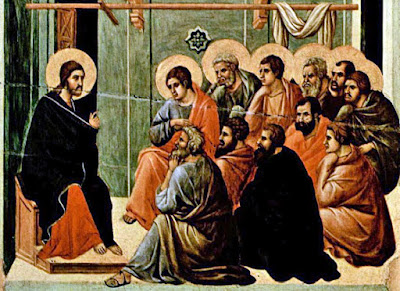When the Day of Pentecost had fully come, they were all with one accord in one place. And suddenly there came a sound from heaven, as of a rushing mighty wind, and it filled the whole house where they were sitting. Then there appeared to them divided tongues, as of fire, and one sat upon each of them. And they were all filled with the Holy Spirit and began to speak with other tongues, as the Spirit gave them utterance. (Acts 2:1–4)
This Spirit descended upon the seventy elders in Moses’ day; my object is to prove that He knows all things and works as He will. The seventy elders were chosen: “The Lord then came down in the cloud, and taking some of the spirit that was on Moses, he bestowed it on the seventy elders”; not that the Spirit was divided, but His grace was divided according to the vessels and the capacity of the recipients. Now there were sixty-eight present, and they prophesied; Eldad and Medad were not present. To make it clear that it was not Moses who bestowed the gift, but the Spirit who wrought, Eldad and Medad, who had been called but had not yet presented themselves, also prophesied.
Joshua, the son of Nun and successor of Moses, was amazed, and coming to Moses said to him: Have you heard that Eldad and Medad are prophesying? They were called and did not come forward; “Moses, my lord, stop them.” I cannot forbid them, he said, for the grace is from heaven. So far am I from forbidding them that I consider it a favor. But I think you have not spoken thus in envy. Be not overzealous on my account, because they have prophesied, and you do not yet prophesy. Await the proper time. “Would that all the people of the Lord might prophesy, whenever the Lord shall give them his spirit.” He spoke the words “whenever the Lord shall give,” prophetically. For He has not given it as yet; so you do not have it yet. Did not Abraham, Isaac, Jacob and Joseph have His spirit? Did not the men of old have it? It is clear that the words, “whenever the Lord shall give,” means “give to all”; now the grace is partial, then it shall be granted profusely. He intimated what was to come to pass among us on the day of Pentecost; for He Himself came down among us. He had come down before upon many, it is true; for it is written: “Now Josue, the son of Nun, was filled with the spirit of wisdom, since Moses had laid his hands upon him.” Note the same ceremonial everywhere, both in the Old and the New Testament. In Moses’ day the Spirit was given by the imposition of hands; and Peter imparted the Spirit by the imposition of hands. Upon you also, who are to be baptized, the grace will come. In what manner I do not say, for I do not anticipate the proper time.
Cyril of Jerusalem, Catechetical Lectures 16.25–26









